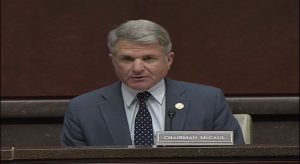McCaul Delivers Opening Remarks at Full Committee Hearing on Modernizing U.S. Arms Exports, Strengthening AUKUS
Washington, D.C. – Yesterday, House Foreign Affairs Committee Chairman Michael McCaul gave the following remarks at a full committee hearing with officials from the State and Defense Departments on challenges our allies and U.S. industry face with our arms exports processes and how those challenges can be bridged to ensure the trilateral security partnership between Australia, the United Kingdom, and the United States is successful.
-Remarks as delivered-
From its increasingly aggressive posture in the waters surrounding Taiwan, to Chairman Xi’s stated goal to unify with Taiwan, the malign actions of the Chinese Communist Party pose a clear and present danger.
I have seen China’s tactics firsthand. I recently led a Congressional Delegation to Asia, where I met with our Indo-Pacific Command, 7th Fleet, and leaders in Japan, South Korea, and Taiwan, including President Tsai.
After I met with President Tsai, the CCP sanctioned me— a badge of honor, as far as I am concerned.
In response to my delegation’s visit and Speaker McCarthy’s meeting with President Tsai, the CCP launched more than 70 aircraft into Taiwanese airspace and deployed 11 warships, including an aircraft carrier, to encircle the island nation.
The CCP is testing their capabilities and Taiwan’s vulnerabilities in preparation for a potential invasion.
This will not intimidate us.
In fact, it only strengthens our resolve to foster a more innovative defense industrial base that can develop and supply weapons for deterrence, and if necessary, [for] defense.
After seeing Taiwan’s defense capabilities firsthand, I can say that they are not where they need to be.
Weapon sales I [and the ranking member] signed off on four years ago… have yet to make it to Taiwan. [President Tsai asked me, “where are my weapons? I paid for them.”]
The war in Ukraine has shown us that weapons are needed before – not after a conflict erupts.
Now, more than ever, we need to work with our allies to counter this growing threat.
The AUKUS partnership between Australia, the United Kingdom, and the United States is just that – it will establish critical deterrence measures.
However, for this trilateral partnership to succeed, we must reform prohibitive policies and complicated arms exports rules as soon as possible through bipartisan legislation.
It is this committee’s responsibility to examine the policy and effectiveness of United States government foreign military sales and the International Traffic in Arms Regulations, known as ITAR, a regulatory measure which controls the export of defense and military technologies from U.S. defense companies.
Last month, I held a classified roundtable with our AUKUS partners first, and then from U.S. industry representatives, to discuss the challenges we face in the region due to growing CCP aggression and how best to address them.
We heard from them that much more needs to be done.
Specifically, ITAR and our antiquated arms sales processes need legislative fixes for AUKUS to be successful.
One of our AUKUS partners dedicates one percent of their annual defense budget to simply navigate U.S. export controls.
In another case, it took a year and a half of paperwork to support the upgrade of a weapon system that we previously sold to them.
Our approach to defense and military technology exports is in dire need of reform.
This administration has failed to deliver, so Congress took bipartisan action in the last NDAA:
- My Taiwan Enhanced Resilience Act ensures there can be creative solutions such as foreign military financing grants, training for Taiwan forces, and war reserve stockpiles to bolster Taiwan’s defense.
- Chairwoman Young Kim’s Arms Exports Delivery Solutions Act mandates the administration to report on why our weapons to Taiwan are delayed and to provide interim capabilities in the face of these delays.
I also included a provision to better bring American innovation into Pentagon procurements, to address delayed weapons development and address high-tech challenges like quantum computing, hypersonics, and artificial intelligence.
Rebuilding our arsenal of democracy will require new thinking and innovative, dynamic companies.
To that end, the House recently passed legislation I introduced with the ranking member to strengthen the AUKUS partnership though cooperation on advanced capabilities.
This legislation focuses on ensuring the State Department is authorizing technology transfers quickly to fully support implementation of this partnership.
I will continue to lead efforts to help ensure the successful implementation of AUKUS throughout this Congress through additional bipartisan legislation.
The longer outdated and costly regulations stand in the way of successful implementation, the more it plays into the CCP’s hands and erodes our closest allies’ security.
We are in a great [global power] competition, and for far too long at both the Department of Defense and the State Department, it’s been business as usual.
The years-long delays are unacceptable. We need results, not interagency finger pointing.
We can no longer accept the status quo of an ineffective and outdated system.
The United States does not seek conflict – but only through strength can we provide the deterrence necessary to secure [the] peace in the region, and around the globe.
History has shown that projecting weakness invites aggression and emboldens dictators and despots.
I believe in Ronald Reagan’s policy of peace through strength. That was the doctrine that defeated the Soviet Union, and one we must continue to employ to project American strength across the globe.
###
